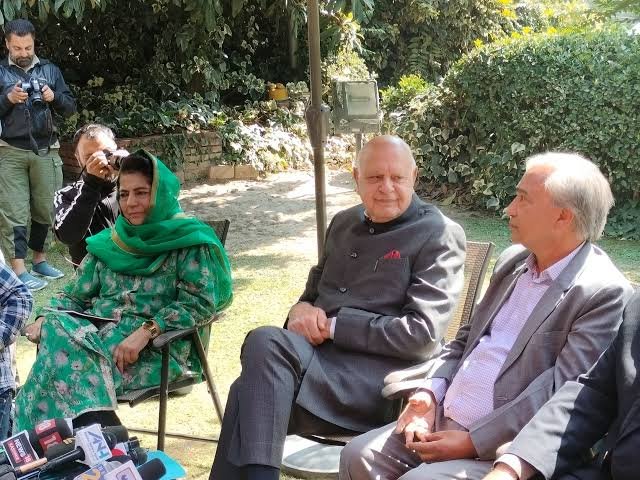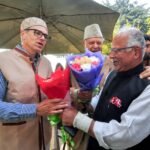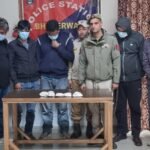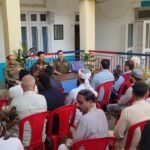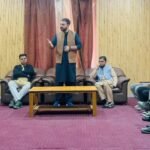How 7 MLAs Ditched Ruling Alliance to Help BJP Clinch Fourth Seat
Four alliance MLAs voted for BJP; two deliberate cancellations and an “extra” vote raise doubts
By Asif Iqbal Naik
Srinagar, October 24: In one of the most stunning political twists in Jammu and Kashmir’s recent history, the Bharatiya Janata Party (BJP) managed to secure an unexpected fourth Rajya Sabha seat, riding on unprecedented cross-voting, deliberate vote cancellations, and an “extra” vote that disrupted the ruling alliance’s calculations.
According to official figures, BJP candidate Sat Pal Sharma polled 32 votes — four more than the BJP’s numerical strength — confirming that at least four MLAs from the ruling alliance or its supporting bloc cross-voted in favour of the BJP.
The second BJP nominee, Shammi Oberoi, won with 31 votes, one more than expected, suggesting that one vote intended for National Conference (NC) candidate Imran Nabi Dar was deliberately diverted.
Imran Nabi Dar, who was expected to secure 28–29 votes, managed only 21, revealing a shortfall of 7–8 votes either lost to cross-voting or cancellations.
The ruling alliance — consisting of 41 NC MLAs, 6 Congress, 7 independents, 3 PDP, and 1 CPI(M) — commanded a solid bloc of 58 votes, comfortably enough to secure both the third and fourth Rajya Sabha seats. However, it managed only 51 valid votes, pointing to seven votes lost or invalidated, which ultimately handed the BJP its crucial fourth seat.
This unexpected setback has sent shockwaves through the alliance, triggering urgent calls for an internal probe into what many leaders described as a “betrayal of mandate and party trust.”
Despite the turmoil, senior NC leader Chowdhary Mohammad Ramzan registered an emphatic victory, securing 58 votes, reaffirming that he enjoyed complete bloc support. However, Sajjad Ahmed Kichloo, the alliance’s second candidate, obtained 56 votes, two less than Ramzan. The missing votes in his column are now believed to have proved decisive in the BJP’s unexpected win.
Adding to the day’s drama, People’s Conference chairman Sajjad Gani Lone abstained from voting, citing political neutrality, a move that has drawn mixed reactions across the spectrum and further complicated the voting arithmetic.
According to Kashmir News Observer (KNO), all political parties — except the Peoples Democratic Party (PDP) — had appointed authorized polling agents to verify marked ballots before they were placed in the ballot box.
In a peculiar twist, Congress MLA Nizamuddin Bhat, who was also serving as his party’s chief polling agent, cast his vote without any substitute agent present. When contacted, Bhat told KNO, “I was the chief polling agent and I had to show my vote to myself.”
Sources within the NC said the PDP MLAs had been instructed to vote for Imran Nabi Dar, not Shammi Oberoi, and had initially agreed. However, the final numbers tell a different story, heightening suspicion of internal dissension or last-minute shifts.
Reacting sharply to the outcome, Chief Minister Omar Abdullah said the incident represented “a betrayal of democratic trust and alliance unity.” In a brief statement, Omar said, “This was not an ordinary election but a test of credibility. Some within our ranks failed that test. We will take necessary action once the full facts are known.”
The Congress Party also expressed disappointment over the outcome. Senior Congress leader called the cross-voting “deeply unfortunate” and said the party would seek a full report from its legislators. “The alliance had a clear majority, yet manipulation and deliberate misconduct changed the outcome. This will not go unexamined,” Wani said.
Meanwhile, BJP leaders celebrated the result, describing it as a “vote of conscience.” BJP MP Sat Sharma says, “This is a moral and political victory. Even alliance MLAs recognised Prime Minister Modi’s leadership.” added that he will raise the issue of public importance as and when he get an opportunity to speak in the parliament.
The episode has created visible fault lines within the ruling alliance, and both NC and Congress are under pressure to identify and act against the MLAs responsible for the cross-voting.
Observers say the Rajya Sabha elections have reshaped the political landscape of Jammu and Kashmir, exposing hidden divisions and rivalries within the alliance — divisions that could grow more pronounced as the 2026 Assembly elections approach.
With Chowdhary Ramzan’s decisive win, Kichloo’s two-vote shortfall, and Sajjad Lone’s abstention, the Rajya Sabha results have not only altered the immediate balance of power but also redefined the trust equation between the alliance partners in Jammu and Kashmir’s turbulent political theatre.

